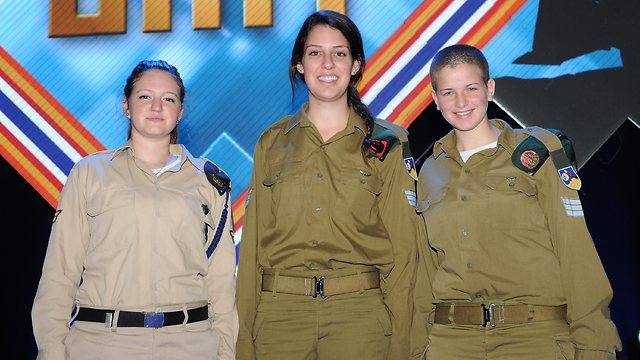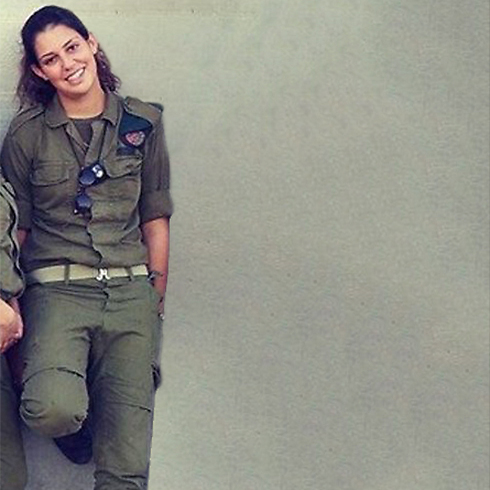
Meet female soldiers who shone during last Gaza conflict
IDF observers who stopped deadly terrorist attacks during Operation Protective edge recount dramatic moments in which the saved the lives of many, and address the public outcry over wording of their citation which praised them for 'not losing their composure'.
Sgt. Ronnie Jackson, 20, an army observer from the observation unit in the "Nesher" battalion who identified the first of 13 terrorists coming out of a tunnel near Kibbutz Sufa, was not even supposed to join the IDF.
She was born in the Kochav HaShahar settlement, the youngest of eight children. Her mother succumbed to cancer when she was just eight-years-old. After her father remarried and moved to Itamar, Ronnie was sent to a boarding school for religious girls, where she declared her religious inclinations and received an exemption from service along with the other girls.

"Only after doing that did I start asking why," she says. "I slowly distanced myself from religion, and since I was left with nothing to do, I signed up to an army preparatory program. When I finished the army prep course, after a year, I realized it would be unethical of me not to contribute to the state.
"My two brothers and five sisters did not enlist, but didn't stand in my way either. When Operation Protective Edge began, we were deployed to the Kerem Shalom outpost. I was hoping my shifts go by with relative calm because action meant danger."
Jackson did have some action, however, on July 17, 2014, at four in the morning, shortly after she started her shift in the operations room.
"All of a sudden I noticed something that wasn't on the screen before that. I zoomed in and started investigating it and saw it was a person. I called my platoon commander, we called in more observation measures, and I counted the terrorists who came out of the tunnel's exit," she says. "I had no doubt these were terrorists, even though I was using thermal binoculars and couldn't see the color of their clothes. They appeared in an area no one was allowed to be in."
From the moment Jackson identified the terrorists, things started moving fast.
"We called up all of the troops, I saw the Air Force bombing them from above, and I held my breath until I heard the call that meant things had gone back to normal. I was working with crazy adrenaline. When it was over, I called my big sister, Nechama, and told her to watch the news because they're talking about me."
After that, the IDF’s Medals and Citation Committee wrote you were being honored for "not losing your composure," and it was only thanks to public criticism that the wording was changed to "remained level-headed."
"So what if they wrote that?" she chuckles. "Why get hung up on words? When I read the original wording, I didn't see anything unusual about it. We, the observers, are not fighting in the field and not firing weapons, but when I try to imagine how many civilians could've been killed, I know it was not for nothing that the army invested in me. I did what was required of me."
Corporal Noa Teitel, 19, from Modi'in, an electronic observation controller in the Navy, also can't understand what the fuss was about over the chauvinistic wording of the citation.
"I really didn't lose my cool," she claims. "It was only after it was over that I realized how easy it could've been to lose my cool."
The incident Teitel was cited for happened on July 8, 2014, when she was operating an electronic system to detect and identify suspicious activity along the coast near Kibbutz Zikim.
"It was between 6-7pm and nearly dark, when all of a sudden I saw four people in the water," Teitel recalls. "They were swimming east, towards the beach, right at us, were wearing black diving suits and held weapons. I didn't yell in fear, but I was afraid. How could I not be? They were 60 meters behind the (border) fence, I could almost feel them, and this was my first operational incident."
The accurate report Teitel gave the post's commander helped him understand what was going on, and after calling up the Navy ships and divers, he himself left the post with his weapon so he could shoot the terrorists if they came near.
"The four of them were thwarted, meaning, killed," she says. "And I went outside to look up at the sky and breathe. I later called my mom and asked her, 'what are the chances they're talking about your daughter in the news?' and she was frightened. I went to take a shower, I felt like I had to wash off this evil, and then returned to the operations room."
With pride?
"Yes, a little bit, but I keep telling myself: 'We're a part of something bigger than ourselves.' That's the Navy's motto."
Sgt. Lihi Meir, 20, from Rishon LeZion, who was released from the "Nesher" battalion six months ago, is taking advantage of the fact she's no longer in uniforms to talk about the negative image of army observers.
"When I was told I'm going to this course, I started crying," she says. "Friends told me it was boring to sit in front of a screen for hours chewing gum to not fall asleep. It was only during the course that I realized how interesting this could be.
"During the war, we were with the northern brigade of the Gaza Division, near Kibbutz Nir Am. I was working two shifts: From 5-9 am and from 5-9 pm, and in between I tried to nap. But when I saw what I saw I became alert. This is something you can't miss."
On July 21, 2014, during her morning shift, Lihi identified five figures dressed in clothes that looked like IDF uniform. When it turned out these were not soldiers, she alerted of the infiltration of terrorists into Israel.
"The terror cell opened fire on our troops who were sent there," she says. "When I saw on the screen that the terrorists were killed, I was on high. I felt like I succeeded. But later, when I heard four of our soldiers were killed (Lieutenant Colonel Dolev Keidar, Second Lieutenant Yuval Heiman, Sergeant Major Bayhesain Kshaun and Sergeant Nadav Goldmacher), I took it very badly. I tried to take comfort in the thought that my quick identification prevent a much bigger disaster."
Nowadays, Lihi works as a waiter and saves money for her big post-army trip.
"The citation is not just meant for me, but to all observers and to all of the recruits who are still debating on whether to become observers. I recommend this job to anyone who wants to have a meaningful service, to make a difference and save lives."











